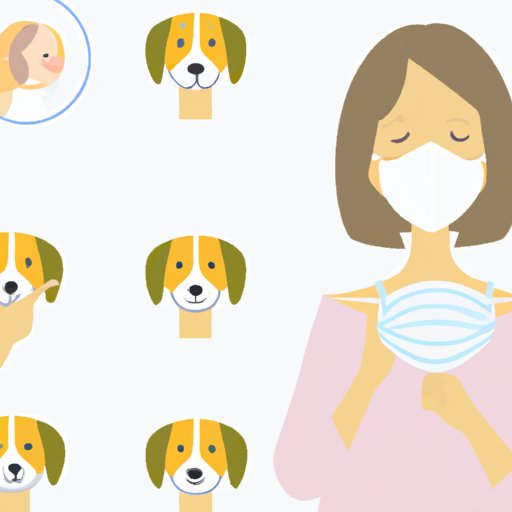Introduction
Living with a pet can be a great source of joy and companionship, but for some people it can also mean dealing with uncomfortable allergy symptoms. Dog allergies can cause sneezing, wheezing, coughing, and even skin irritation. Fortunately, there are steps you can take to minimize the effects of your allergies and still enjoy the companionship of a canine friend.
Avoid Contact with Dogs and Their Fur
The first step in preventing dog allergy symptoms is to limit your contact with dogs and their fur. This means avoiding direct contact with dogs as much as possible, such as petting them or letting them sleep in your bed. If you must come into contact with a dog, make sure that you wash your hands afterwards.
You should also take steps to reduce the amount of pet dander in your home. Vacuum frequently, especially areas where pets have been, and use air purifiers to keep the air clean. You may also want to consider investing in furniture and bedding made from hypoallergenic materials, which can help reduce your exposure to pet dander.

Take an Antihistamine Before Contacting a Dog
If you know you will be coming into contact with a dog, taking an antihistamine beforehand can help reduce your reaction. Over-the-counter antihistamines such as Benadryl, Claritin, and Zyrtec are available without a prescription, and they can help relieve sneezing, itching, and other allergy symptoms. Be sure to follow the instructions on the package for proper dosage and timing.

Wear a Face Mask When in the Presence of a Dog
Another way to protect yourself from dog allergies is to wear a face mask when you are around them. There are several types of face masks available, including disposable surgical masks, cloth masks, and N95 respirators. Make sure that the mask fits snugly against your face and that it covers both your nose and mouth. It’s also important to practice good hygiene when wearing a face mask; wash your hands before putting it on and after taking it off.

Talk to Your Doctor About Immunotherapy Treatments
If you suffer from severe dog allergies, your doctor may recommend immunotherapy treatments. These treatments involve exposing you to small doses of the allergen over time, which can help your body build up a tolerance and reduce the severity of your reactions. Your doctor may also recommend medications such as corticosteroids or anti-inflammatory drugs to help reduce inflammation and ease your symptoms.
Conclusion
Living with a pet does not have to be impossible if you suffer from dog allergies. By following these steps, you can minimize the effects of your allergies and still enjoy the companionship of a canine friend. Avoid direct contact with dogs and their fur, take an antihistamine before coming into contact with a dog, wear a face mask when in the presence of a dog, and talk to your doctor about immunotherapy treatments. With the right precautions, you can still experience all the joys of having a pet in your life.
(Note: Is this article not meeting your expectations? Do you have knowledge or insights to share? Unlock new opportunities and expand your reach by joining our authors team. Click Registration to join us and share your expertise with our readers.)
